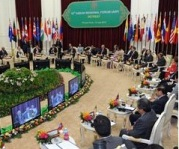
Practical information
In 2006, the European Commission launched an ambitious plan to conclude a new generation of Free Trade Agreements (FTAs) with Asian markets as part of its Global Europe strategy. Today the use of such FTAs is all the more important since negotiations at the WTO are stalled, but also more contested as the state of the global economy remains volatile and uncertain. The objective of this one-day meeting is to take stock of the implementation of the Commission"s FTA strategy and the positions of a sampling of Asian partners, highlighting both the opportunities and challenges from the perspective of government, business and independent observers.
8:45 - Welcome addresses
Dominique David, Executive Vice-President, Ifri
François Brottes, President of the Economic Affairs Committee, Assemblée nationale, France
H.E.M. Michel Ching-Long Lu, Representative of the Taipei Representative Office in France
9:15 - The evolution of “Global Europe” - Analyzing shifts in the EU"s free trade strategy
Vital Moreira, Chairman, International Trade Committee, European Parliament
Mauro Petriccione, Director for Asia and Latin America, DG Trade, European Commission
Patrick Messerlin, Professor of Economics, Sciences Po, Groupe d"économie mondiale
Jan Wouters, Jean Monnet Chair ad personam EU and Global Governance, University of Leuven
Chair: Françoise Nicolas, Director, Ifri Center for Asian Studies
10:45 - Networking/refreshment break
11:00 - Lessons learned from the Korea-EU FTA (followed by Q&A)
H.E.M. Hye Min Lee, Ambassador of the Republic of Korea to the French Republic (Former Chief Negotiator for the Korea-EU FTA)
11:30 - Observations from concluded and ongoing FTA negotiations
The cases of South Korea and Singapore
Etienne Oudot de Dainville, Assistant Director for Commercial and Investment Policy, Direction générale du Trésor, France
Lay Hwee Yeo, Director, EU Center in Singapore
Raphael Leal-Arcas, Professor, International Economic Law, Queen Mary, University of London
Chair: Françoise Nicolas, Director, Ifri Center for Asian Studies
12:30 - Lunch break
14:00 -The way forward - Challenges and prospects of future agreements
The cases of Japan and Taiwan
Mauro Petriccione, Director for Asia and Latin America, DG Trade, European Commission
Kenji Goto, Deputy Director-General, Economic Affairs Bureau, MOFA, Japan
Chun-fang Hsu, Economic Counselor, Ministry of Economic Affairs, Taiwan
Fredrik Erixon, Director, European Center for International Political Economy
Chair: Patrick Messerlin, Professor, Sciences Po, Groupe d"économie mondiale
15:30 - Networking/refreshment break
15:45 - Economic impact of EU-Asia FTAs - consequences for business
Roland Verstappen, Chairman of the International Relations Committee, BUSINESSEUROPE
Erik Bergelin, Director of Trade & Economics, European Automobile Manufacturers" Association
Koshi Noguchi, Vice President - Corporate Government & External Relations Brussels Representative - EU Relations Toshiba of Europe Ltd.
Moonkoo Huh, Head of the Europe Office, Korea International Trade Association
Cosmas Yi-Hou Lu, Managing Director, Barclays Bank PLC, CEO/Taiwan and Branch Manager, Taipei
Chair: Françoise Nicolas, Director, Ifri Center for Asian Studies
17:15 - Concluding remarks by Thierry de Montbrial, Founder and President, Ifri
Contact: John Seaman, Ifri Center for Asian Studies
Other events

Paris Naval Conference 2026: Naval Rearmament and Operations in Contested Waters
This fourth edition of the Paris Naval Conference (CNP), bringing together high-level military, industrial, and academic speakers, will address the challenges associated with general naval rearmament and naval operations in increasingly contested environments.





